POL-227 Spring 2018: Analyzing Democracy and Political Obligation
VerifiedAdded on 2023/06/13
|5
|1120
|448
Essay
AI Summary
This essay delves into the intricate relationship between democracy and political obligation, examining how the democratic nature of a state influences citizens' moral duties to obey laws. It distinguishes between legal and ethical obligations, highlighting political obligation as the enforcement of moral duties through law. The essay references historical examples and philosophical perspectives, including Plato's Crito, to explore theories of consent, gratitude, fairness, and justice in relation to political obligation. It also addresses the potential weaknesses of democracy and the importance of political consciousness in modern societies. The conclusion emphasizes the benefits of democratic governance in empowering citizens to elect leaders who can effectively promote the common good through legislation and regulatory measures.
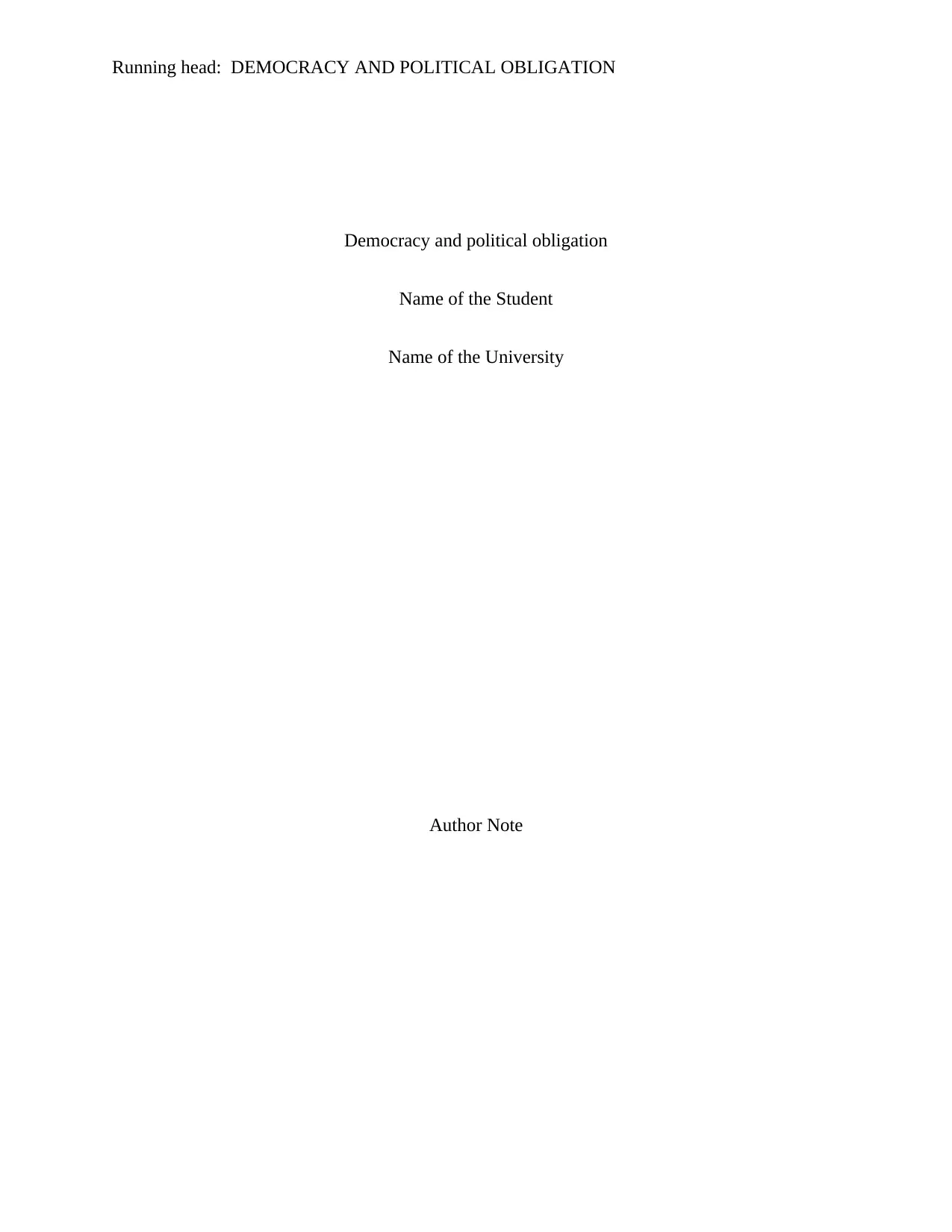
Running head: DEMOCRACY AND POLITICAL OBLIGATION
Democracy and political obligation
Name of the Student
Name of the University
Author Note
Democracy and political obligation
Name of the Student
Name of the University
Author Note
Paraphrase This Document
Need a fresh take? Get an instant paraphrase of this document with our AI Paraphraser
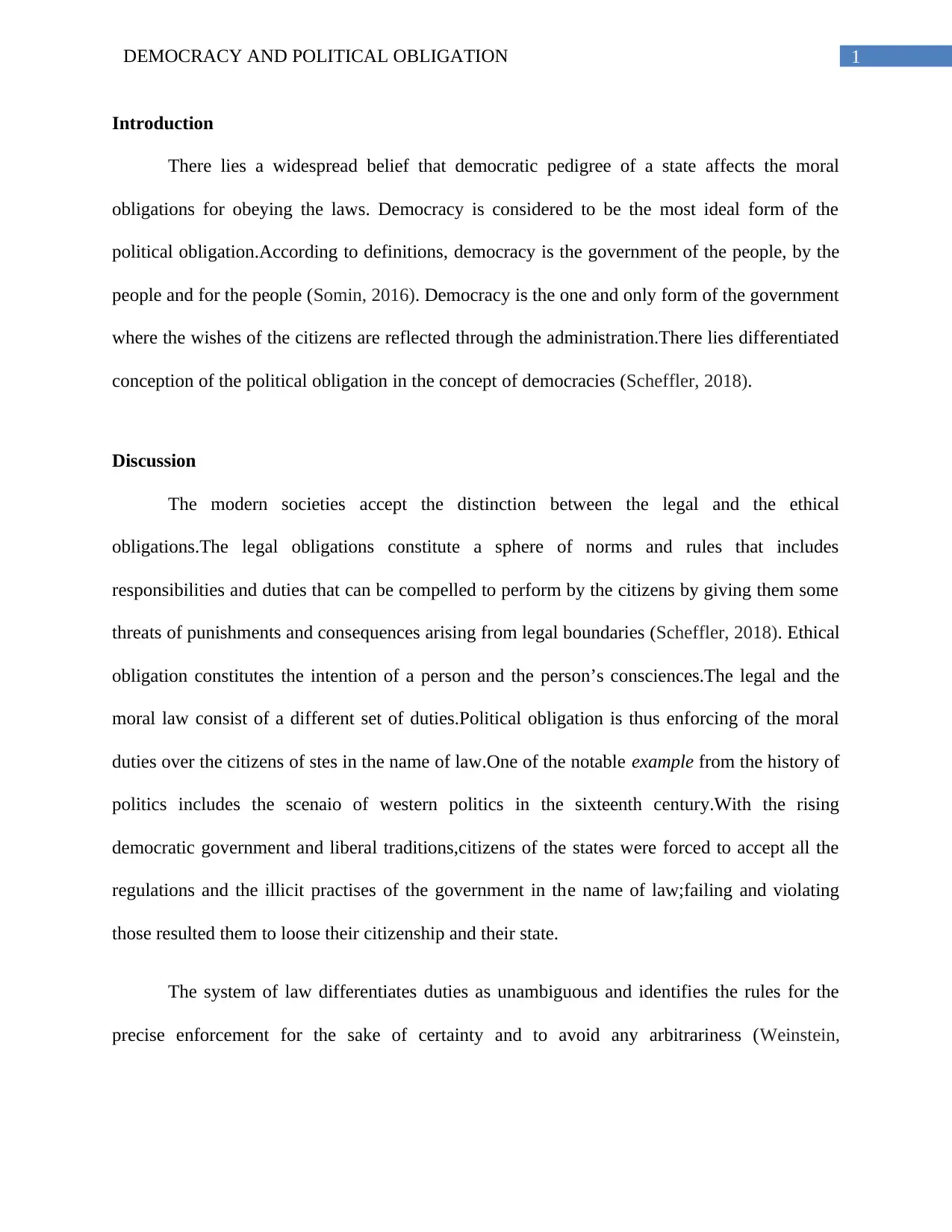
1DEMOCRACY AND POLITICAL OBLIGATION
Introduction
There lies a widespread belief that democratic pedigree of a state affects the moral
obligations for obeying the laws. Democracy is considered to be the most ideal form of the
political obligation.According to definitions, democracy is the government of the people, by the
people and for the people (Somin, 2016). Democracy is the one and only form of the government
where the wishes of the citizens are reflected through the administration.There lies differentiated
conception of the political obligation in the concept of democracies (Scheffler, 2018).
Discussion
The modern societies accept the distinction between the legal and the ethical
obligations.The legal obligations constitute a sphere of norms and rules that includes
responsibilities and duties that can be compelled to perform by the citizens by giving them some
threats of punishments and consequences arising from legal boundaries (Scheffler, 2018). Ethical
obligation constitutes the intention of a person and the person’s consciences.The legal and the
moral law consist of a different set of duties.Political obligation is thus enforcing of the moral
duties over the citizens of stes in the name of law.One of the notable example from the history of
politics includes the scenaio of western politics in the sixteenth century.With the rising
democratic government and liberal traditions,citizens of the states were forced to accept all the
regulations and the illicit practises of the government in the name of law;failing and violating
those resulted them to loose their citizenship and their state.
The system of law differentiates duties as unambiguous and identifies the rules for the
precise enforcement for the sake of certainty and to avoid any arbitrariness (Weinstein,
Introduction
There lies a widespread belief that democratic pedigree of a state affects the moral
obligations for obeying the laws. Democracy is considered to be the most ideal form of the
political obligation.According to definitions, democracy is the government of the people, by the
people and for the people (Somin, 2016). Democracy is the one and only form of the government
where the wishes of the citizens are reflected through the administration.There lies differentiated
conception of the political obligation in the concept of democracies (Scheffler, 2018).
Discussion
The modern societies accept the distinction between the legal and the ethical
obligations.The legal obligations constitute a sphere of norms and rules that includes
responsibilities and duties that can be compelled to perform by the citizens by giving them some
threats of punishments and consequences arising from legal boundaries (Scheffler, 2018). Ethical
obligation constitutes the intention of a person and the person’s consciences.The legal and the
moral law consist of a different set of duties.Political obligation is thus enforcing of the moral
duties over the citizens of stes in the name of law.One of the notable example from the history of
politics includes the scenaio of western politics in the sixteenth century.With the rising
democratic government and liberal traditions,citizens of the states were forced to accept all the
regulations and the illicit practises of the government in the name of law;failing and violating
those resulted them to loose their citizenship and their state.
The system of law differentiates duties as unambiguous and identifies the rules for the
precise enforcement for the sake of certainty and to avoid any arbitrariness (Weinstein,
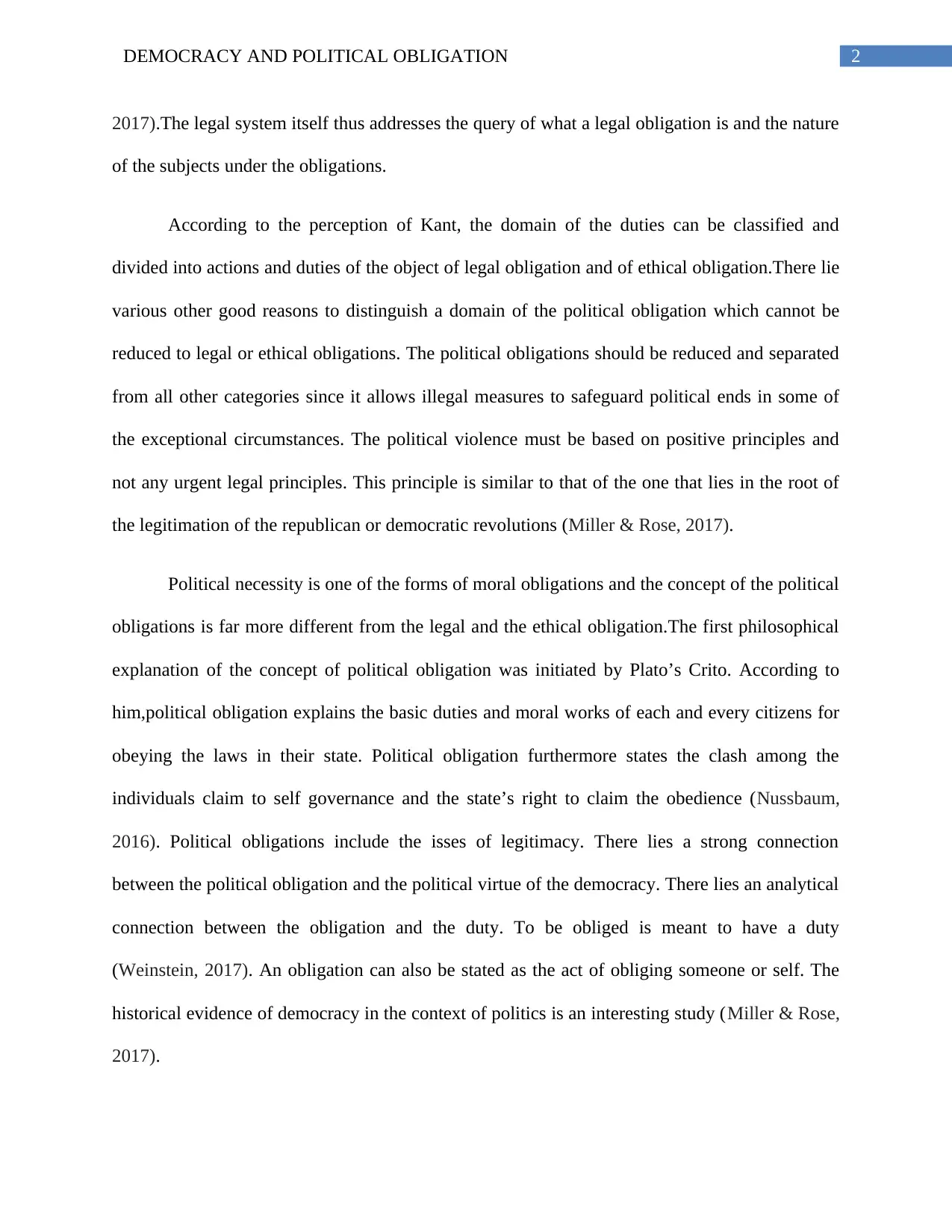
2DEMOCRACY AND POLITICAL OBLIGATION
2017).The legal system itself thus addresses the query of what a legal obligation is and the nature
of the subjects under the obligations.
According to the perception of Kant, the domain of the duties can be classified and
divided into actions and duties of the object of legal obligation and of ethical obligation.There lie
various other good reasons to distinguish a domain of the political obligation which cannot be
reduced to legal or ethical obligations. The political obligations should be reduced and separated
from all other categories since it allows illegal measures to safeguard political ends in some of
the exceptional circumstances. The political violence must be based on positive principles and
not any urgent legal principles. This principle is similar to that of the one that lies in the root of
the legitimation of the republican or democratic revolutions (Miller & Rose, 2017).
Political necessity is one of the forms of moral obligations and the concept of the political
obligations is far more different from the legal and the ethical obligation.The first philosophical
explanation of the concept of political obligation was initiated by Plato’s Crito. According to
him,political obligation explains the basic duties and moral works of each and every citizens for
obeying the laws in their state. Political obligation furthermore states the clash among the
individuals claim to self governance and the state’s right to claim the obedience (Nussbaum,
2016). Political obligations include the isses of legitimacy. There lies a strong connection
between the political obligation and the political virtue of the democracy. There lies an analytical
connection between the obligation and the duty. To be obliged is meant to have a duty
(Weinstein, 2017). An obligation can also be stated as the act of obliging someone or self. The
historical evidence of democracy in the context of politics is an interesting study (Miller & Rose,
2017).
2017).The legal system itself thus addresses the query of what a legal obligation is and the nature
of the subjects under the obligations.
According to the perception of Kant, the domain of the duties can be classified and
divided into actions and duties of the object of legal obligation and of ethical obligation.There lie
various other good reasons to distinguish a domain of the political obligation which cannot be
reduced to legal or ethical obligations. The political obligations should be reduced and separated
from all other categories since it allows illegal measures to safeguard political ends in some of
the exceptional circumstances. The political violence must be based on positive principles and
not any urgent legal principles. This principle is similar to that of the one that lies in the root of
the legitimation of the republican or democratic revolutions (Miller & Rose, 2017).
Political necessity is one of the forms of moral obligations and the concept of the political
obligations is far more different from the legal and the ethical obligation.The first philosophical
explanation of the concept of political obligation was initiated by Plato’s Crito. According to
him,political obligation explains the basic duties and moral works of each and every citizens for
obeying the laws in their state. Political obligation furthermore states the clash among the
individuals claim to self governance and the state’s right to claim the obedience (Nussbaum,
2016). Political obligations include the isses of legitimacy. There lies a strong connection
between the political obligation and the political virtue of the democracy. There lies an analytical
connection between the obligation and the duty. To be obliged is meant to have a duty
(Weinstein, 2017). An obligation can also be stated as the act of obliging someone or self. The
historical evidence of democracy in the context of politics is an interesting study (Miller & Rose,
2017).
⊘ This is a preview!⊘
Do you want full access?
Subscribe today to unlock all pages.

Trusted by 1+ million students worldwide
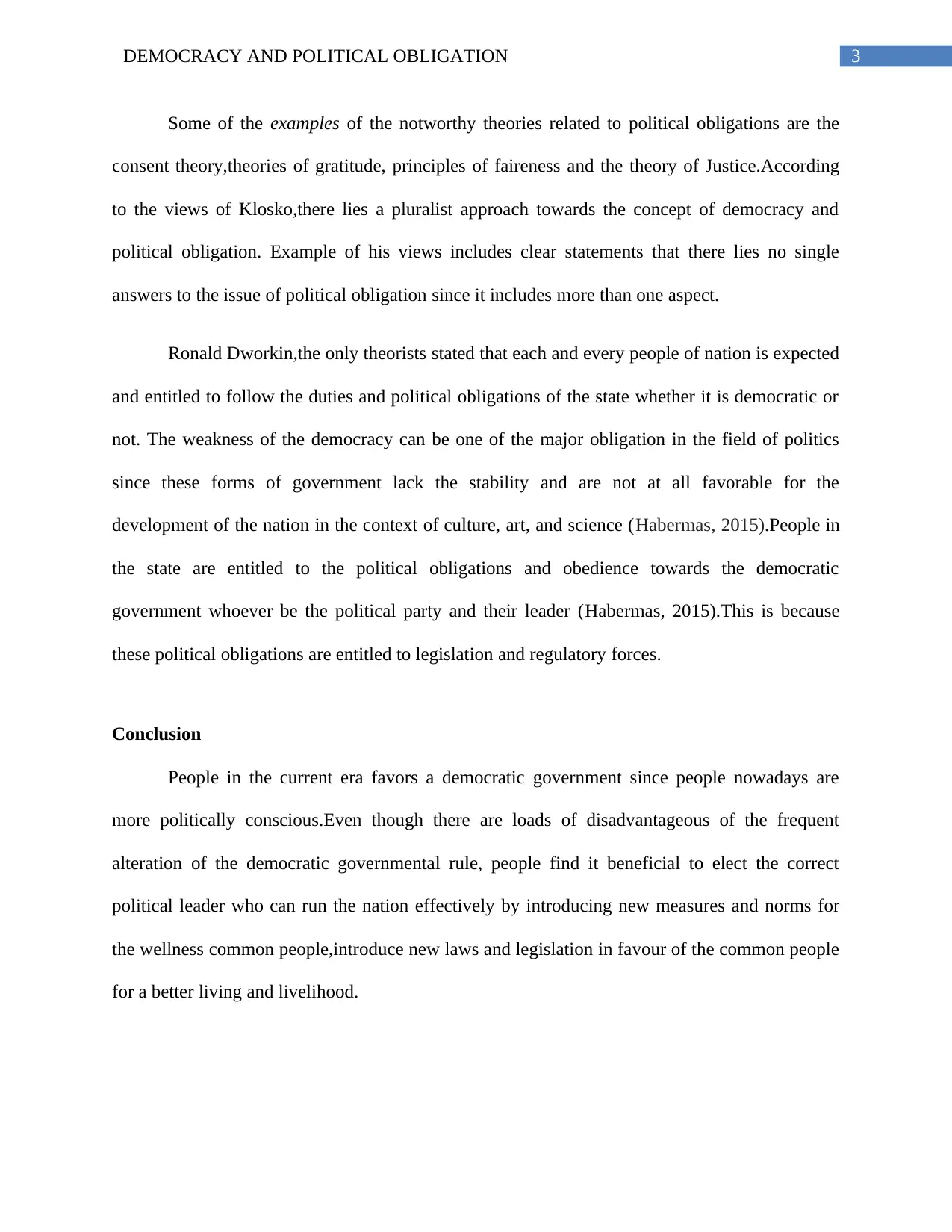
3DEMOCRACY AND POLITICAL OBLIGATION
Some of the examples of the notworthy theories related to political obligations are the
consent theory,theories of gratitude, principles of faireness and the theory of Justice.According
to the views of Klosko,there lies a pluralist approach towards the concept of democracy and
political obligation. Example of his views includes clear statements that there lies no single
answers to the issue of political obligation since it includes more than one aspect.
Ronald Dworkin,the only theorists stated that each and every people of nation is expected
and entitled to follow the duties and political obligations of the state whether it is democratic or
not. The weakness of the democracy can be one of the major obligation in the field of politics
since these forms of government lack the stability and are not at all favorable for the
development of the nation in the context of culture, art, and science (Habermas, 2015).People in
the state are entitled to the political obligations and obedience towards the democratic
government whoever be the political party and their leader (Habermas, 2015).This is because
these political obligations are entitled to legislation and regulatory forces.
Conclusion
People in the current era favors a democratic government since people nowadays are
more politically conscious.Even though there are loads of disadvantageous of the frequent
alteration of the democratic governmental rule, people find it beneficial to elect the correct
political leader who can run the nation effectively by introducing new measures and norms for
the wellness common people,introduce new laws and legislation in favour of the common people
for a better living and livelihood.
Some of the examples of the notworthy theories related to political obligations are the
consent theory,theories of gratitude, principles of faireness and the theory of Justice.According
to the views of Klosko,there lies a pluralist approach towards the concept of democracy and
political obligation. Example of his views includes clear statements that there lies no single
answers to the issue of political obligation since it includes more than one aspect.
Ronald Dworkin,the only theorists stated that each and every people of nation is expected
and entitled to follow the duties and political obligations of the state whether it is democratic or
not. The weakness of the democracy can be one of the major obligation in the field of politics
since these forms of government lack the stability and are not at all favorable for the
development of the nation in the context of culture, art, and science (Habermas, 2015).People in
the state are entitled to the political obligations and obedience towards the democratic
government whoever be the political party and their leader (Habermas, 2015).This is because
these political obligations are entitled to legislation and regulatory forces.
Conclusion
People in the current era favors a democratic government since people nowadays are
more politically conscious.Even though there are loads of disadvantageous of the frequent
alteration of the democratic governmental rule, people find it beneficial to elect the correct
political leader who can run the nation effectively by introducing new measures and norms for
the wellness common people,introduce new laws and legislation in favour of the common people
for a better living and livelihood.
Paraphrase This Document
Need a fresh take? Get an instant paraphrase of this document with our AI Paraphraser
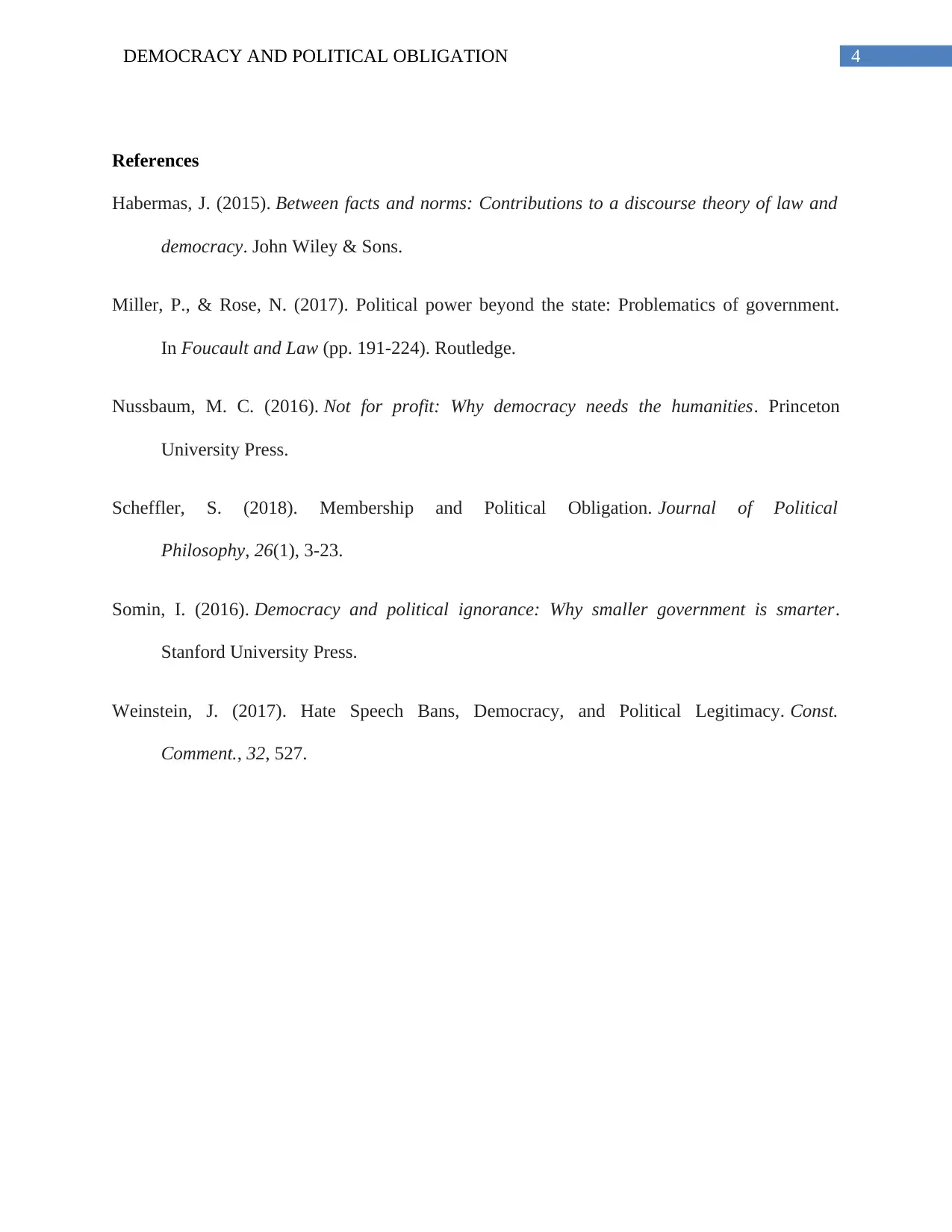
4DEMOCRACY AND POLITICAL OBLIGATION
References
Habermas, J. (2015). Between facts and norms: Contributions to a discourse theory of law and
democracy. John Wiley & Sons.
Miller, P., & Rose, N. (2017). Political power beyond the state: Problematics of government.
In Foucault and Law (pp. 191-224). Routledge.
Nussbaum, M. C. (2016). Not for profit: Why democracy needs the humanities. Princeton
University Press.
Scheffler, S. (2018). Membership and Political Obligation. Journal of Political
Philosophy, 26(1), 3-23.
Somin, I. (2016). Democracy and political ignorance: Why smaller government is smarter.
Stanford University Press.
Weinstein, J. (2017). Hate Speech Bans, Democracy, and Political Legitimacy. Const.
Comment., 32, 527.
References
Habermas, J. (2015). Between facts and norms: Contributions to a discourse theory of law and
democracy. John Wiley & Sons.
Miller, P., & Rose, N. (2017). Political power beyond the state: Problematics of government.
In Foucault and Law (pp. 191-224). Routledge.
Nussbaum, M. C. (2016). Not for profit: Why democracy needs the humanities. Princeton
University Press.
Scheffler, S. (2018). Membership and Political Obligation. Journal of Political
Philosophy, 26(1), 3-23.
Somin, I. (2016). Democracy and political ignorance: Why smaller government is smarter.
Stanford University Press.
Weinstein, J. (2017). Hate Speech Bans, Democracy, and Political Legitimacy. Const.
Comment., 32, 527.
1 out of 5
Related Documents
Your All-in-One AI-Powered Toolkit for Academic Success.
+13062052269
info@desklib.com
Available 24*7 on WhatsApp / Email
![[object Object]](/_next/static/media/star-bottom.7253800d.svg)
Unlock your academic potential
Copyright © 2020–2026 A2Z Services. All Rights Reserved. Developed and managed by ZUCOL.





